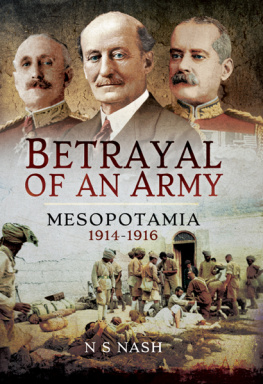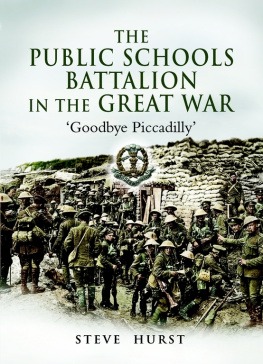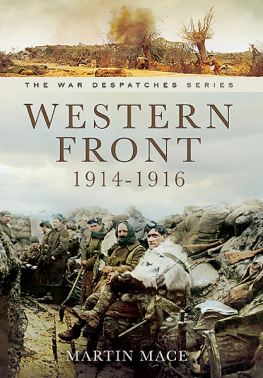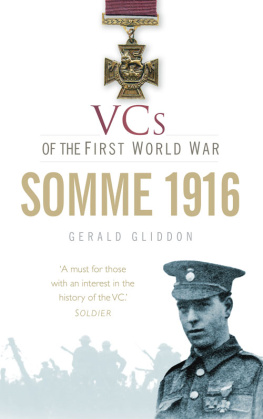First published in Great Britain in 1982 by William Kimber & Co. Limited
Reprinted in this format in 2014 by
PEN & SWORD MILITARY
An imprint of
Pen & Sword Books Ltd
47 Church Street
Barnsley, South Yorkshire
S70 2AS
Copyright Joan Norman and the Estate of William Congreve, 1982, 2014
ISBN 978 1 47382 119 4
A CIP catalogue record for this book
is available from the British Library
All rights reserved. No part of this book may be reproduced or
transmitted in any form or by any means, electronic or mechanical
including photocopying, recording or by any information storage and
retrieval system, without permission from the Publisher in writing.
Printed and bound in England
By CPI Group (UK) Ltd, Croydon, CR0 4YY
Pen & Sword Books Ltd incorporates the Imprints of Aviation, Atlas,
Family History, Fiction, Maritime, Military, Discovery, Politics, History,
Archaeology, Select, Wharncliffe Local History, Wharncliffe True Crime,
Military Classics, Wharncliffe Transport, Leo Cooper, The Praetorian Press,
Remember When, Seaforth Publishing and Frontline Publishing
For a complete list of Pen & Sword titles please contact
PEN & SWORD BOOKS LIMITED
47 Church Street, Barnsley, South Yorkshire, S70 2AS, England
E-mail: enquiries@pen-and-sword.co.uk
Website: www.pen-and-sword.co.uk
This very fine diary of an extraordinary young officer was first published in 1982 and reprinted in 1983; it was very well edited by Terry Norman, who came across the diary when he was working on his book on one of the bloodiest parts of the Somme battlefield of 1916 The Hell They Called High Wood; for it was during the associated fighting, on 20 July 1916, that William la Touche Congreve was killed.
The diary provides a fascinating mixture of material, revealing his close and affectionate family life, his heart felt reaction to the loss of friends, his almost forensic analysis of many of the actions in which he was involved accompanied, in many cases, by very fine sketch maps, critiques of some of the commanders, battalions and formations, his sense of humour and an insight into a young officer who in rather less than two years served as an ADC to several divisional commanders, was a G Ops staff officer and, finally, the job that he prized above all the others, that of a brigade major. He provides a useful commentary from one who was more in the know than most other officers, supplemented by close contact with his father who was, in the same time period, General Officer Commanding a brigade (18), a division (the 6th) and a corps (XIII).
William Congreve came from a family with a rich military background. One of his ancestors invented the Congreve Rocket, an improved version of rockets used in India by Tippoo Sahib (or Tipu Sultan) against the British and which went on to feature in the British capture of Washington in the war of 1814. Because of this family connection with rockets, Williams father, Walter, earned the nickname Squibs.
Walter Congreve, whilst serving in the Rifle Brigade in the South African war, won the Victoria Cross at Colenso in 1899 for his bravery in saving a couple of guns from capture. His mother also came from a military background; indeed, almost as soon as war broke out in 1914 she got herself abroad and served as a Red Cross nurse and driver in Antwerp, amongst one of the last to leave the city before its fall in October. She continued nursing in a hospital south of Paris. Williams middle brother, Geoffrey, was a midshipman in the early days of the Second World War; he went on to win the DSO during the Norway campaign in 1940 and was killed whilst engaged in operations off France in 1941. The youngest son, Christopher John, actually visited the trenches near Hooge in August 1915 with his father (then a divisional commander) when only twelve years old; proudly wearing his Boy Scout uniform, his appearance doubtless caused a sensation amongst the men in the line.
William Congreve was born in 1891 and followed a conventional school career for someone of his social standing and background, though he went to Eton rather than to Harrow, his fathers school. He contracted rheumatic fever when he was young and spent some time convalescing with family friends, the Hudsons Edward Hudson was the founder of Country Life. Their home, the completely redesigned and largely new Lindisfarne Castle, was designed by Sir Edwin Lutyens, also to become a firm family friend. William made such an impact on the Hudsons, who were childless, that they named him as heir to the castle.
Congreve never returned to formal schooling. Instead he went to a crammer from the age of fifteen to prepare him for Sandhurst (possibly as a consequence of his illness, though special preparation for Sandhurst was quite common) and by which time he had grown into a very tall, rather gangling looking man, well over six feet. At Sandhurst he excelled and passed out second. Commissioned, as was his father, in the Rifle Brigade, he went to Tipperary, Ireland to serve with the third battalion.
William Congreve was a faithful diarist until an accidental fire at the end of November 1915 destroyed his recent entries. That night he wrote: I dont feel much inclined now to go on with a diary. So much that was interesting was burnt, all the September 25th fighting up at Hooge; and I cant be bothered to write it all out again. Fortunately, he did, but only briefly as the time that he needed to devote to it was probably consumed by his task as a brigade major.
The closeness of the family to which he belonged is reflected in his diary affectionate references to his mother and his younger brothers, respect and love for his father, comments about his wider family. Perhaps one of the most touching of these relates to his uncle, Major Arthur King, 4/Rifle Brigade, who was killed on 15 March in a counter attack on the Mound at St Eloi. Congreve urged others to bring him in and went out into No Mans Land himself, on many occasions, in an attempt to recover the body. In the end he was found and Congreve again went out to remove from the body what he could which was not much. The glasses were too smashed and the torch too gruesome. He determined that the body was too close to the Germans (thirty yards) to be got away safely it was never recovered and Major King is therefore commemorated on the Menin Gate.
Congreve also had the gift of attracting a wide circle of friends, both of his and older generations and from all levels of society. Generally he manages to be fairly unemotional when recording their deaths. For example, his servant in the early days of the war was Rifleman Philip Harris. When on 21 September 1914 Congreve moved to be ADC to Hubert Hamilton of the 6th Division, he noted how Hughes was a sad loss. Indeed, several weeks later, he went to see his father, then headquartered near Croix de Bacs and went off, confident that he could bring back Harris to be with him again: I had one bad blow When I got there I heard that he was dead, killed in an attack ten days ago. Rifleman Philip Harris has no known grave and is commemorated on the Ploegsteert Memorial. A further great blow was the death of his great friend Captain Maurice George Godolphin-Osborne of the Rifle Brigade. Seriously wounded in the head, Congreve went to visit him in the Casualty Clearing Station on many occasions. He died on 25 February 1915, Congreve noting: The padre tells me that Maurice died quite peacefully at 12.30. I knew this before I saw him. I feel I dont much care what happens now; and of the funeral at Bailleul (in the Communal Cemetery, Grave F 9) two days later, he wrote that it made little or no impression on me, which is either because I have lately learned to understand or else forgotten how to.





![Billy Ray Cyrus - Old Town Road [Remix] Sheet Music](/uploads/posts/book/348571/thumbs/billy-ray-cyrus-old-town-road-remix-sheet-music.jpg)





